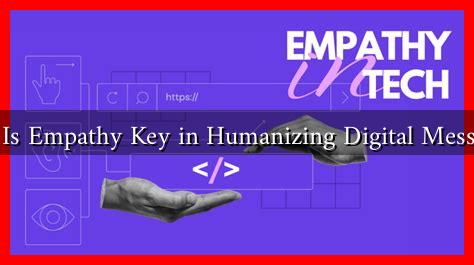-
Table of Contents
Why Is Empathy Key in Humanizing Digital Messages?
In an increasingly digital world, the way we communicate has evolved dramatically. With the rise of social media, emails, and instant messaging, the nuances of human interaction can often be lost. This is where empathy comes into play. Empathy, the ability to understand and share the feelings of another, is crucial in humanizing digital messages. This article explores why empathy is essential in digital communication and how it can enhance relationships, improve engagement, and foster a sense of community.
The Importance of Empathy in Communication
Empathy is not just a soft skill; it is a vital component of effective communication. In face-to-face interactions, non-verbal cues such as body language and tone of voice help convey emotions. However, in digital communication, these cues are often absent, making it easy for messages to be misinterpreted. Here are some reasons why empathy is essential in this context:
- Building Trust: Empathetic communication fosters trust. When individuals feel understood, they are more likely to engage openly.
- Enhancing Clarity: Empathy helps clarify intentions and emotions, reducing the chances of misunderstandings.
- Encouraging Engagement: Messages that resonate emotionally are more likely to elicit responses and interactions.
Empathy in Digital Marketing
In the realm of digital marketing, empathy can significantly impact customer relationships. Brands that communicate with empathy are more likely to connect with their audience on a personal level. For instance, a study by HubSpot found that 70% of consumers are more likely to buy from a brand that understands their needs and values. Here are some ways brands can incorporate empathy into their digital marketing strategies:
- Personalized Messaging: Tailoring messages to reflect the individual preferences and experiences of customers can create a more meaningful connection.
- Active Listening: Engaging with customer feedback and responding thoughtfully shows that a brand values its audience’s opinions.
- Storytelling: Sharing relatable stories can evoke emotions and create a sense of community among customers.
Case Studies: Successful Empathetic Communication
Several brands have successfully utilized empathy in their digital communication strategies, leading to increased customer loyalty and engagement. Here are a couple of notable examples:
- Dove’s Real Beauty Campaign: Dove’s campaign focused on real women and their stories, challenging traditional beauty standards. By empathizing with their audience’s struggles, Dove created a powerful emotional connection that resonated widely.
- Airbnb’s “We Accept” Campaign: In response to social issues, Airbnb launched a campaign promoting inclusivity and acceptance. By addressing the concerns of marginalized communities, they demonstrated empathy and commitment to social responsibility, which strengthened their brand image.
The Role of Empathy in Crisis Communication
During crises, empathetic communication becomes even more critical. Organizations that respond with empathy can mitigate damage and maintain trust. For example, during the COVID-19 pandemic, many companies shifted their messaging to focus on community support and understanding. This approach not only humanized their brands but also reinforced their commitment to social responsibility.
Conclusion: The Power of Empathy in Digital Communication
In conclusion, empathy is a vital element in humanizing digital messages. It enhances communication by building trust, improving clarity, and encouraging engagement. Brands that prioritize empathetic communication can create deeper connections with their audience, leading to increased loyalty and positive brand perception. As we continue to navigate the digital landscape, embracing empathy will be essential for fostering meaningful relationships and creating a more connected world.
By understanding the importance of empathy in digital communication, individuals and organizations can transform their interactions, making them more human and relatable. In a world where technology often feels impersonal, empathy serves as a bridge that connects us all.

